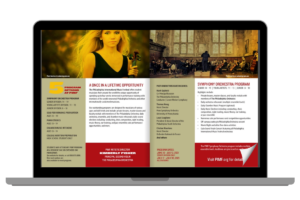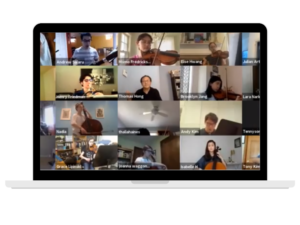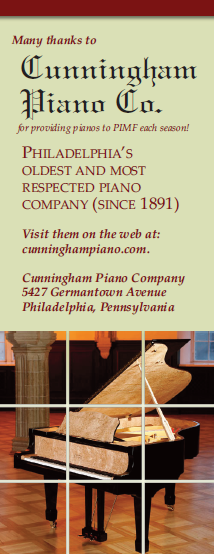 Elizabeth Starr Masoudnia, English Horn of The Philadelphia Orchestra since 1995, is also an active soloist and chamber musician. In April 2005 she premiered Nicholas Maw’s English Horn Concerto, a piece commissioned for her by The Philadelphia Orchestra. Her performance of the work was subsequently broadcast on National Public Radio. She has also premiered works by David Ludwig and Joseph Hallman on The Philadelphia Orchestra’s Chamber Music Series.
Elizabeth Starr Masoudnia, English Horn of The Philadelphia Orchestra since 1995, is also an active soloist and chamber musician. In April 2005 she premiered Nicholas Maw’s English Horn Concerto, a piece commissioned for her by The Philadelphia Orchestra. Her performance of the work was subsequently broadcast on National Public Radio. She has also premiered works by David Ludwig and Joseph Hallman on The Philadelphia Orchestra’s Chamber Music Series.
Prior to joining The Philadelphia Orchestra, Ms. Masoudnia played English Horn with the Minnesota Orchestra for seven years. She was a participant in the Marlboro Music Festival for two summers and played concertos with the Concerto Soloists of Philadelphia (now the Chamber Orchestra of Philadelphia) and the New York Symphonic Ensemble on four tours of Japan and Southeast Asia. She is a featured artist on a CD of Beethoven and Triebensee oboe trios, released on the ASV Quicksilver label.
A native of Philadelphia, Ms. Masoudnia graduated from the Curtis Institute of Music, where she studied with John de Lancie, former principal oboe of The Philadelphia Orchestra. Her teacher prior to that time was The Philadelphia Orchestra’s former English Hornist, Louis Rosenblatt. Ms. Masoudnia is currently a faculty member of Temple University and the Philadelphia International Music Festival.
We initiated a conversation with members of The Philadelphia Orchestra about their beginnings in music, their inspirations, and aspirations. Please join us each month to see many of your new music camp favorites featured right here!
Q: When and why did you begin playing a musical instrument?
I began playing the oboe at the age of 8. My third grade music teacher suggested that I play an instrument. I had heard an oboe the day before at a school assembly and liked the sound. It was hard to find someone willing to teach me oboe at that age, but finally a Curtis student agreed to give me lessons.
Q: What did you like most about your first music teacher?
He was patient and taught me all the basics of oboe playing, including basic reed making. My mother used to drive me at 7:00 in the morning for lessons before school.
Q: Describe your first instrument? Do you know where it is today?
My first instrument was a plastic Yamaha oboe. I don’t know where it is today.
Q: How old were you when you performed your first solo and was it a successful performance?
I was 12 years old when I played my first solo; I thought it was successful at the time.
Q: Is there a piece of music that never fails to move you emotionally? Please describe.
I love the Mother Goose Suite by Maurice Ravel. I think it is perfectly composed and shows off the colors and moods of the symphony orchestra exceptionally well.
Q: What element or experience from your childhood still drives you today in your professional life?
I was very lucky in that I was able to hear The Philadelphia Orchestra live starting at a young age. This really helped me develop my sense of sound and musicality. I can still hear the sound of The Philadelphia Orchestra then and try to reproduce it when I play in the Philadelphia Orchestra now!
Q: Other than making music, what activity inspires you most?
I love to read almost anything. As a youth I devoured mostly fiction books but now I realize that there is so much to learn and enjoy educating myself reading nonfiction on a variety of topics.
Q: Are other members in your family musical? Why or why not.
Although a few of my siblings tried playing musical instruments, they all moved on to other interests. There were no serious musicians on either side of my family, although my father’s father said that we were descendants of William Byrd.
Q: Do you still get nervous before a performance, and if so – how do you cope?
Depending on the repertoire and condition of my instrument and reed, I can get nervous. For me, over-preparing helps me be ready for anything that might come my way on the day of the performance. I also find that getting enough sleep, eating healthy foods; exercise and yoga help my mental and physical state during performance opportunities.
Q: How do you handle mistakes during a performance?
Of course, my goal is not to make mistakes. But if I do, I try to figure out why it happened so I can prevent something similar from happening again. I also try to remember that the goal is to convey music in the most appropriate and compelling way, not perfection.
Q: What is your current practice routine prior to a solo performance?
I try to practice (including recording my playing and listening back) early so I have time close to the performance to concentrate on making the best reed for the circumstances.
Q: Why would you recommend students to attend the Philadelphia International Music Festival?
I think that PIMF provides a wonderful opportunity to study with the world-class musicians of The Philadelphia Orchestra. It is also fun to make music with other students who care about making music in the beautiful environment of the Bryn Mawr College campus, where the music camp takes place.
Q: What advice do you have for young musicians considering music performance as a future profession?
I would say if a student adores music and can’t think of anything else that they would rather do, than they should find the best teacher possible, attend live concerts, practice in a thoughtful, disciplined manner, and try to get in the best conservatory possible.



